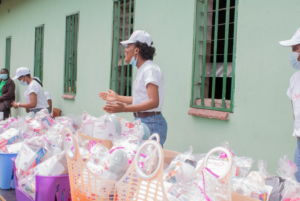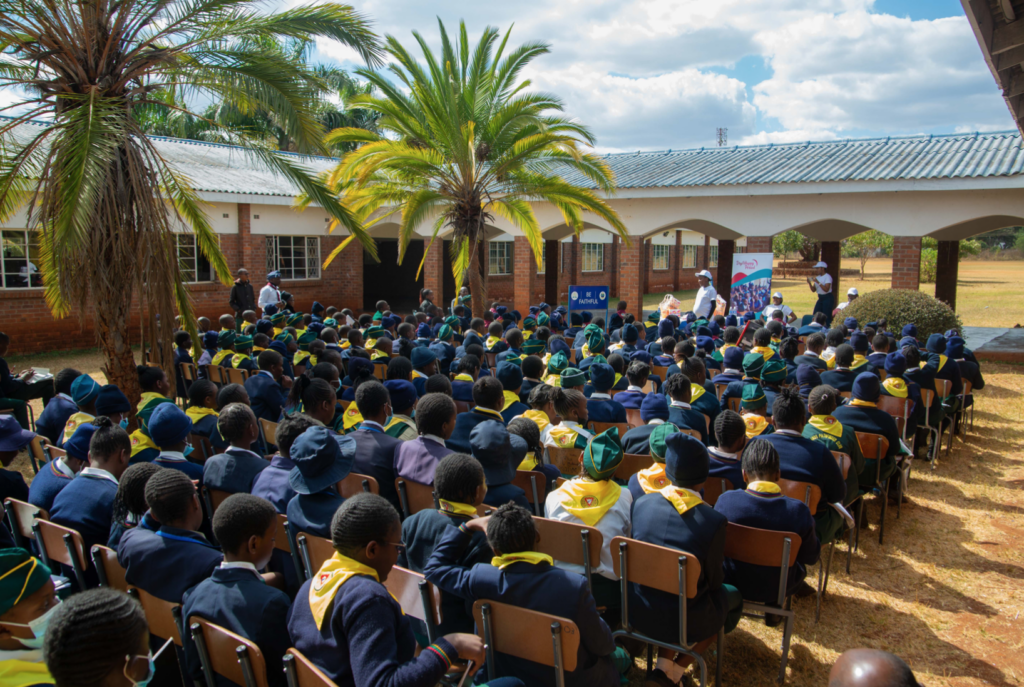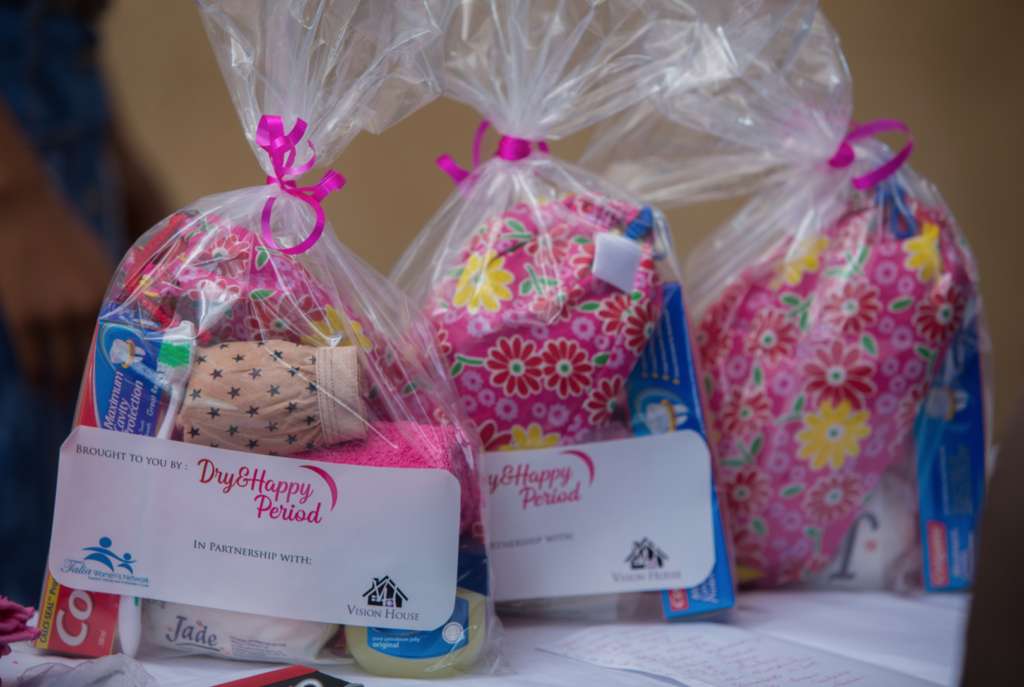500 million women around the world don’t have menstrual products or facilities for menstrual hygiene, The World Bank.
“As a global community, we must actively work towards ensuring that all adolescents, regardless of background, gender, location, or socioeconomic status, have equal access to the SRHR knowledge, support, and services they need to thrive. By ensuring inclusive access to SRHR resources, we empower adolescents to make informed choices, contribute to their well-being, and create a more equitable world for all,” Rachel Nyasha, Founder of Dry and Happy Period (Full of Life Trust Initiative).
Childhood memories leave an indelible mark on all of us; they have the power to shape our personality and influence our life’s choices. For the Global Peace Chain Ambassador of Zimbabwe, Rachel Nyasha, a memory of kindness and generosity from her youth became the answer in her life’s quest that would lead her to be a sexual and reproductive health and rights advocate as well as the founder of an organization dedicated to combating period poverty and fostering the overall well-being of girls in Zimbabwe.
The vision of the organization, however, extends beyond immediate relief. Full of Life Trust acknowledges the necessity for a broader scope in SRHR education, encompassing both genders.
That unforgettable memory occurred when Rachel was 12. She was raised in Harare, Zimbabwe, where she used to attend church regularly. One day, during a youth camp at church, she had her period unexpectedly.
“I was 12 and had my period away from home without any sanitary pads on me. It was a bit scary,” recalls Rachel. “ I told my Pastor ( Rev Faithful Mutibvu) who was in her 20s then and she was very kind to me. She gave me a small bag which contained a pack of pads and a bottle of perfume (Spirit of Heaven). This was my first time receiving a bottle of perfume as a gift and the pads were very comfortable and that memory had a very deep impact on me. I told myself: ‘When I grow up, I would love to do this for someone else’. You know, make a girl feel comfortable and happy during her period.”
Happy Period for Girls in Zimbabwe
Rachel grew up and went to college to get a bachelor’s degree in Business Management and Information Technology but the memory of her Pastor’s kindness remained as a treasure she held very dear in her heart, something that would lead to her true passion.
“One day, that memory of my Pastor and what she did for me came back,” remembers Rachel. “So, I decided I wanted to give back to my community through donating sanitary pads to girls in need.”

At 27 years old, Rachel began her journey of community service by visiting her Pastor and talking about the immense impact she had on her life and how she wanted to do the same for other girls. Rev Faithful was surprised but she encouraged Rachel to pursue her dream and connected her with Mrs. Ethel Chitanda, who then connected her to other women who could help her out, like girl-empowering organizations and reusable pads manufacturers.
“In 2018 I had my first project, it was great because everyone around me got involved. I spoke to my friends, my family, my coworkers, and even my boss at that time to get donations. I used my salary as well,” remembers Rachel. “We bought reusable pads and we donated 20 packs of reusable pads to girls in need at one of the community centers in Harare. I was very excited and that is how I started the project”.
Period Poverty in Zimbabwe
In Zimbabwe 1 of every 4 people is multidimensionally poor (25.8% of the population) and an additional 26.3% of the population is vulnerable to multidimensional poverty, according to the Multidimensional Poverty Index 2023 from the United Nations Development Programme.
The economic situation of Zimbabwe also creates another kind of poverty for women and girls known as period poverty. This is the inability to buy menstrual supplies including pads, tampons, pain medication, or underwear which may cause health problems including infections, according to the United Nations Population Fund Zimbabwe.
Furthermore, Girls in Control – Compiled findings from studies on menstrual hygiene management of schoolgirls noted that 72% of school girls have never used pads while 17% of them use cotton wool or pieces of cloth. This resulted in 62% of girls missing school for up to 2 days due to their period, 28% missing 2 to 4 days, and 10% missing 4 days or more in 2014.
According to the studies, there are tangible cultural taboos surrounding menstruation. In Zimbabwe, 54% of school girls said they had been mocked or stigmatized for having their period, 26% felt isolated and 13% said boys called them names. Therefore, in 2014 girls indicated they would dry their period underwear and clothes under the bed.

Educating on Sexual and Reproductive Health and Rights
“I realized that the need was bigger than just the pads. The girls needed to know how to manage their periods properly so there was the need to improve MHM practices and help reduce the stigma surrounding menstruation. As it is still taboo to talk about your menstrual cycle, to talk about the changes that happen in your body in some places. And I thought to myself: ‘Since I am already doing this…”
As the girls also began to ask questions about their sexual and reproductive health during the information sessions, Rachel decided that she needed to have Sexual and Reproductive Health and Rights Facilitators join her for her next project.
“So now our project focuses on enhancing menstrual health and hygiene management and sexual and reproductive health and rights education in schools,” explains Rachel.
They visited Zambara Secondary School in the rural district of Manicaland, Zimbabwe, where they successfully conducted an MHM and SRHR training for over 500 girls between 13 and 16 years and donated 120 Menstrual Hygiene packs which contain reusable pads that can be used for up to 12months ensuring that no school days are missed for lack of sanitary pads.

In 2022, Rachel decided to create an organization that would allow her to grow and help more adolescent girls and young women with her project. By the beginning of 2023, Rachel founded the nonprofit Full of Life Trust, which now has a team of 5 members.
In 2024, Rachel will visit 3 schools to educate on menstrual hygiene and management as well as sexual and reproductive health and rights and will impact over 1500 students in Epworth, Zimbabwe.
“Epworth is a dormitory community. It’s one of the places with high rates of child-headed homes, and child prostitution in Zimbabwe,” explains Rachel. “It is typically characterized by poverty, limited access to basic amenities, and a lack of proper healthcare facilities. As a result, the issue of menstrual hygiene and the availability of sanitary pads becomes a significant concern for girls in Epworth as purchasing sanitary pads is often considered a luxury they can’t afford. As a result, girls are forced to use alternative and unhygienic materials such as old rags, which can lead to infections and discomfort, and they end up missing school.”
For her next project in Epworth, Rachel decided to look for funds and a friend suggested approaching The Pollination Project.
“I heard about TPP from a friend. I looked it up and I decided to give it a try. I applied and we were awarded the grant. The grant, being the first we have received, is a monumental milestone for us and has been received with immense joy and appreciation. We are grateful for the support and belief in our work. It gives us the strength to keep pushing,” says Rachel with a glowing smile that reflects how much she loves making a difference in the lives of young people, as someone did once for her.
Join Us
If you are inspired by this work and have an idea for a project that addresses an issue that you are passionate about, we’d like to invite you to submit an application and together we will build a better, more compassionate future!
If you would like to support the work of more heartivists like this around the world, please visit our donation page and be a part of the change today!
